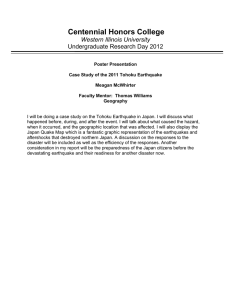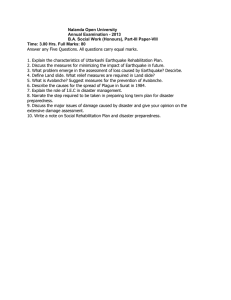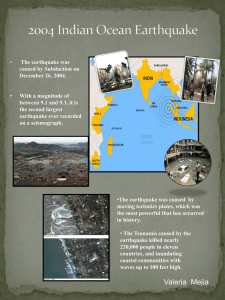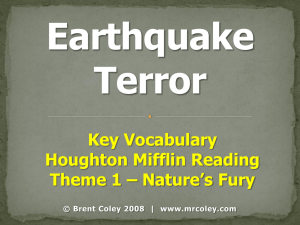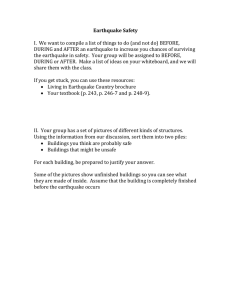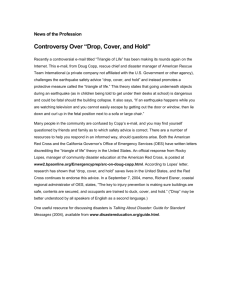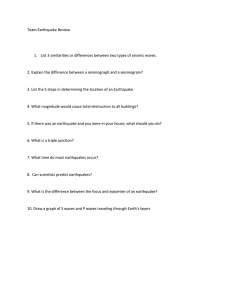Understand Bay Area Problems
advertisement
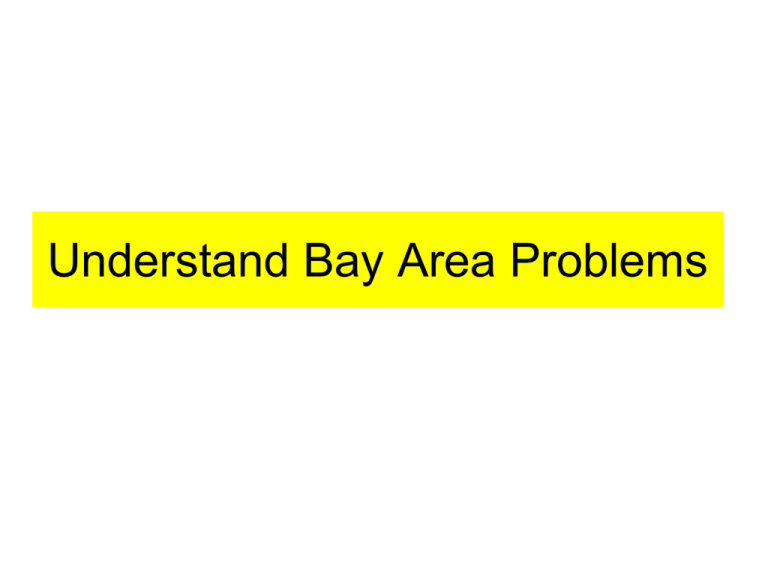
Understand Bay Area Problems Bay Area Faults Earth Material Transportation routes BART Landslides Liquefaction Flooding Fires 1906 Kobe, 1995 1989, Loma Prieta In addition: • Power outages: (10 days in New Orleans) • Loss of immediate emergency services • Loss of local communication Hayward fault earthquake • Potential of a M7 earthquake • 2 ½ million people live in close proximity • Unconsolidated sediments and bay mud • Transportation lines • Directly through urban areas Catastrophe • Is partially defined when the disaster is so large that all forms of emergency plans fail • Innovative and non-linear ideas are needed • Government cannot always respond in this manner • Martial law-1906 earthquake • “Looters” apprehended while victims were without help- Katrina Katrina • August-December 16,000 people displaced • 1000 schools gone • 41/2 million cubic yards of debris • 815 million dollars of public assistance • 10 days for PG&E to reestablish service • People tend to help each other • Government is afraid of losing control • Looters: shoot to kill Government Assistance-Recovery: 1906 earthquake Breakfast, March 11th, 1933 2000 Sailors and Marines helped in the aftermath San Simeon Earthquake • • • • • • Mw 6.5 12/22/03 Reverse fault Hypocenter: 12 miles MM VIII 2 fatalities San Simeon Earthquake • Declared a state emergency –December 27th • Federally eligible funds for rental assistance and home repairs- $68 million • Small business bureau- $5 million • OES- dealing with Southern Ca firestorm and Homeland Security • 2500 people visited FEMA centers San Simeon Earthquake • Need for Mutual Aid Resources to coordinate money distribution • Cell-phone compliance with building code • Improve building codes • URM structures must post sign warning of danger Search and Rescue • Urban Search and Rescue system • 27 teams • Funded by FEMA • Each team has 62 specialists • medical personnel, structural engineers, canines Search and Rescue • Trained and certified • know how to safely go into collapsed structures and systematically search an area • locate trapped people and let the handler know Disaster Mitigation Act of 2000 • A state, local or tribal government shall develop a plan and submit the plan to the Federal government for approval ABAG’S Local Hazard Mitigation Plan • Public policies: potential hazards • Fulfill the requirements of the Disaster Mitigation Act of 2000 • Funded by FEMA Recovery in the United States • Federal Government-Homeland Security and Federal Emergency Management Agency • State Government- Office of Emergency Services • Local Government- County and City Federal Government • Federal Government-Homeland Security and Federal Emergency Management Agency • President declares the area a national disaster • Distributes emergency money and accepts applications for low cost loans • May work with up to 28 other federal agencies – Department of energy – Small business bureau – Department of agriculture Federal Government • Provides the initial emergency response through its service agencies • Activates the Emergency Operations Center and the Emergency Operations Plan • Coordinates the response with public and private organizations • Activates mutual aid State Government • Reviews and evaluates the local situation • Determines whether the situation is beyond the capability of the State to handle • Proclaims a state of emergency • Requests Federal assistance State Government • Office of Emergency Services • Disaster response- gathering of accurate disaster damage data for the Governor and President • Recovery- help direct funds and help where needed • 6 regions • Emergency training Office of Emergency Services • San Jose PREPARED • Local chapter of state agency to provide education, training and support to individuals and emergency response teams The Red Cross • Chartered by Congress in 1905 • national and international relief • disaster relief includes shelter, food, health and mental health services • assistance is given to help people resume their normal activities • provides blood American Red Cross • Feeds emergency workers • helps people outside a disaster area obtain information about individuals located within a disaster area • relies on volunteers • education and preparation • responds to more than 67,000 disasters/year Human impact Personal messages posted on van at Emergency Center. Loma Prieta earthquake, 1989 Photo credit: C.E. Meyer, U.S. Geological Survey Recovery: developing countries • Dependent on international aid: private and government organizations • Sumatra earthquake and tsunami, 2004 • Pakistan earthquake, 2005 • China earthquake, 2009 • Haiti earthquake, 2010 • Chile earthquake, 2010 Evaluation of Structures Turning off the gas • Turn the valve with a wrench or special tool • The off position shows the valve perpendicular to the pipe • turn 1/4 of a turn Personal Preparedness • Emergency plans • Eliminate non-structural hazards • Prepare emergency supplies: home and car • Understand possible hazards in Bay Area depending on location of epicenter • Understand hazards at locations • Understand possible scenarios: work; school; home • Know what to do when shaking ends Thank-you, for a great semester! • Know where the nearest fault is at home, work or school • Be aware of the surroundings, at all times • Have an emergency route planned back to home before the earthquake occur • Communicate an emergency plan with family members or roommates • Have food, water and medical supplies on hand • Best wishes to survive the next earthquake!
